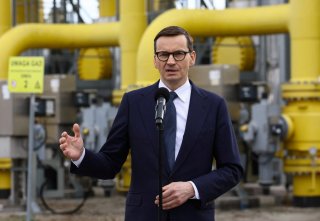Europe Faces Gas Shortages as Russia Turns off the Tap
Before the invasion, Russia supplied roughly 40 percent of Europe’s total energy demand.
Following Moscow’s decision to impose sanctions on European subsidiaries of Gazprom, Russia’s state-run hydrocarbon giant, and Ukraine’s closing of a key Russian pipeline that runs to Europe, gas prices have shot up throughout Europe, adding new urgency to the continent’s search for alternative sources of natural gas.
Gas prices on the Title Transfer Facility (TTF) market in the Netherlands, one of Europe’s largest natural gas producers, increased by around 20 percent on Thursday—a direct response to Gazprom’s announcement that it had sanctioned its European subsidiaries, including Gazprom Germania, which were put under government trusteeship. Gazprom also sanctioned EuRoPol GAZ, a pipeline operator in Poland that carries Russian gas to Europe.
The Russian gas company indicated in a statement that it had instituted “a ban on transactions and payments to entities under sanctions”—which it clarified referred to “a ban on the use of a gas pipeline owned by EuRoPol GAZ to transport Russian gas through Poland.”
A complete list of entities sanctioned by the Russian government was posted on the Kremlin’s website. Most were oil and gas companies based in countries that had placed sanctions on Moscow at the onset of Russia’s invasion of Ukraine. Kremlin spokesman Dmitry Peskov argued that Russia could not pursue commercial relations with the companies in question and explicitly banned them all from supplying Russian gas to domestic consumers.
The sudden cut in Russian gas has left some companies, including Gazprom Germania, struggling to find new import sources. The German government indicated that some of Gazprom Germania’s subsidiary companies had stopped receiving gas because of Russian sanctions but added that the company was seeking alternative sources abroad.
Prior to its imposition of sanctions, Russia had expressed a willingness to continue business with the European Union (EU) but insisted that EU countries deemed “hostile” to Russia pay for their gas imports in rubles—a measure intended to prop up demand for the ruble and prevent its devaluation, which would affect Russia’s ability to pay for imports. Most European countries refused to follow this arrangement, arguing that they had purchased from Russia under long-term contracts specified in dollars or euros and that any new Russian demand about the currencies used would represent a breach of contract.
Before the invasion, Russia supplied roughly 40 percent of Europe’s total energy demand, or around 155 billion cubic meters of natural gas in total.
Trevor Filseth is a current and foreign affairs writer for the National Interest.
Image: Reuters.

